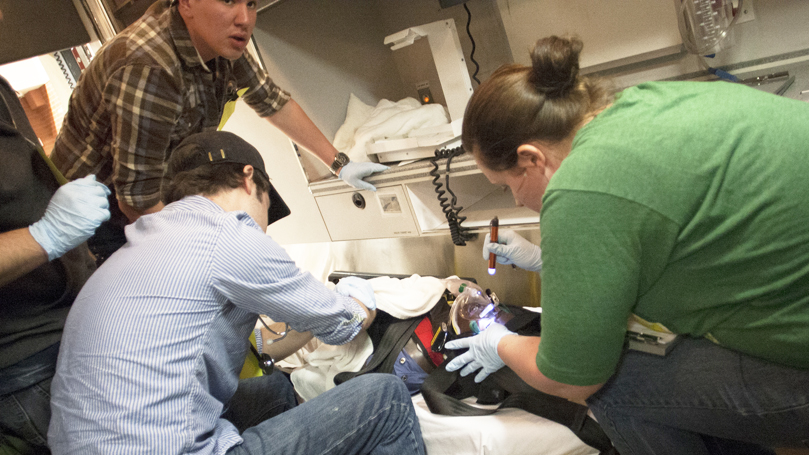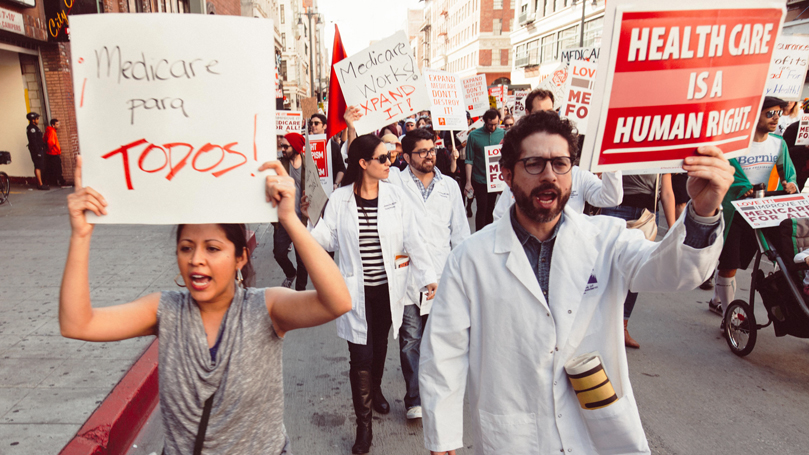
When I first started down my path in Emergency Medical Services, I was not a Marxist, however the years of dealing with the unfortunate realities of an uncaring capitalist system that commodifies the public’s health and wellbeing changed that. The experiences which unfolded within the walls of ambulances and emergency rooms served as an ideological catalyst, igniting in me a profound realization: the very healthcare system I had dedicated my career to was not one dedicated to saving lives, but one which prioritizes profit above all else. As I reflect on my journey through Emergency Medical Services, I am compelled to share how confronting the harsh realities of our healthcare system transformed my perspective, leading me to embrace Marxism.
One striking feature of our healthcare system that I grappled with is the glaring disparity of persistently low wages for paramedics and EMTs. Despite the exorbitant rates associated with ambulance bills, the patient would be billed anywhere from one to two thousand dollars for an ambulance, whereas I would be paid 14 dollars an hour as the paramedic providing those services. I have seen many patients experiencing acute medical emergencies adamantly refuse my aid to avoid the staggering bills. Without socialized medicine, the issue of insurance coverage frequently instills fear into patients causing them to hesitate when considering an ambulance or other medical care.
It always perplexed me that in our current system of healthcare coverage, insurance companies are incentivized to not provide healthcare. The less healthcare they provide, the more profits they can reap, essentially leading us to pay excessive amounts and getting little in return. This has unforeseen consequences of course, such as discouraging people from early treatment, which can cause a simple medical condition to develop into a more serious problem. For instance, a routine checkup can catch hypertension (high blood pressure), which is easily treated by lifestyle changes or medication. But hypertension, left untreated, can have nasty consequences like stroke or kidney failure — which are not only much more costly fiscally, but have much more of an impact on the quality of life of the patient, and can lead to death or disability. I came to understand that under capitalism, healthcare is not provided to heal but to generate profit. As someone who became a paramedic out of a genuine desire to help my community, I was not able to reconcile this misalignment of interests.
Throughout my time in Emergency Medical Services, I have come to recognize that the lack of social services combined with the current form of policing intensify inequality and put additional strain on our healthcare system. Particularly in rural areas, where access to social services may be limited, the only form of social services available can be emergency services or hospitals. This leads to many suffering from mental health crises or substance abuse issues to end up in ambulances or emergency departments. This can place a heavy burden on providers who may not be equipped to deal with these complex cases.
Furthermore, the overreliance on police to respond to situations that require compassion and a delicate approach adds to the strain. I have personally witnessed numerous instances where individuals with mental health disorders or substance abuse struggles have been drawn into the criminal justice system, as opposed to receiving the support and treatment they genuinely require. Law enforcement officers, instead of facilitating access to appropriate care, have escalated these situations to the point of arrest, employing phrases such as “go to the hospital or go to jail” as coercive measures. I have witnessed the distressing impact of this approach on vulnerable individuals, including a homeless man with schizophrenia and a depressed veteran who had no immediate medical concerns but faced pressure to go to the hospital or face arrest. This inhumane, inefficient and ineffective system highlights the urgent need for comprehensive police reform, better social services, and alternative crisis response models that prioritize community well-being and promote better health outcomes.

A worrying trend in healthcare is the privatization of ambulance services, the negatives of which have become quite apparent if you work in EMS or healthcare in general. The inherent goal of these private ambulance services is the same as any private business — to generate profit, generally by inflating the costs of ambulance services, and by underpaying the EMTs and paramedics staffing their ambulances. This low pay is common in EMS and is compounded by long hours and poor working conditions, leading to a nationwide paramedic shortage. Consequently, rural areas, which are already reeling from the dozens of rural hospital closings, bear the brunt of this shortage.
Private ambulance companies, capitalizing on fiscal conservatism, may entice municipal governments with promises of cost savings while providing the same level of coverage. However, the reality often falls short of these promises. When a municipality opts for a private ambulance service, they may dispose of their existing equipment or sell it to the private company, transferring staff, and paying a fee for coverage. Subsequently, the private ambulance service diverts resources from essential 911 calls to nonessential transfers between hospitals or to nursing homes, prioritizing profitability over timely emergency response for the community they are meant to serve. Once a municipality relinquishes its equipment and transitions to a private service, reacquiring the necessary resources becomes costly, and staffing becomes hard to recoup. Aware of this predicament, private ambulance services often increase the cost of providing services to the municipal government. This disconcerting cycle highlights the adverse effects of privatized ambulance services, underscoring the urgent need for a reevaluation of our healthcare system’s priorities.
The careless pursuit of profits is not just limited to insurance and pervades almost every aspect of healthcare. I’ve witnessed staffing levels in hospitals and nursing homes be continuously pushed to their limits. Doctors and nursing staff frequently have unsafe numbers of patients under their care at one time in order to minimize labor costs — to the detriment of the patients and the staff. These overburdened providers struggle to treat patients, which in turn can cause ambulance crews to wait up to an hour in the emergency room, resulting in less ambulances for the public, leading to longer response times, which could be the difference between life or death.
Furthermore, the exploitative practices of pharmaceutical companies, such as exorbitant medication prices, have at times forced my patients to ration their medications (which may cause the medication to not work at all) or forgo them entirely due to the unaffordable costs, which may not even be covered by insurance.
It is crucial to highlight the role of these very pharmaceutical companies in creating the opioid epidemic currently ravaging the country. Essentially, pharmaceutical companies were able to lie to doctors about the risk of addiction to their prescription opioid painkillers, leading to large amounts of opioid sales. In 2010, the U.S. Federal Government began to crack down on the overprescription of opioid painkillers, which led to many of those who have been using prescription painkillers to turn to heroin. In my years of EMS, I have witnessed the devastating toll of addiction firsthand, with countless overdoses and tragic stories of individuals ensnared by prescription painkillers, only to be left with limited options and turning to the streets in desperation.
The 1999 film Bringing Out the Dead vividly portrays the realities of EMS and healthcare in general, and it mirrors the systemic issues and inherent contradictions of our current capitalist society. The film’s depiction of the protagonist’s disillusionment and desperate search for meaning resonated with my own journey in EMS as I struggled with the ethical dilemmas of the healthcare system.
My experiences as an EMS worker became a case of bringing out the red. They highlighted the harsh realities of a profit-driven health care system, which in turn led me to a greater understanding of the exploitative nature of capitalism at large. They have deeply shaped my worldview, cementing my belief in the urgent need for a Marxist perspective that challenges the profit-driven system currently structuring our healthcare system. Over time, I have come to realize that achieving the true goal of healthcare can only be achieved by dismantling the profit-driven system and embracing a socialist approach that places people’s well-being above all else.
Images: EMT/Nursing Pediatric Emergency Simulation by COD Newsroom (CC BY 2.0); Medicare for All Rally by Molly Adams (CC BY 2.0)


 Join Now
Join Now